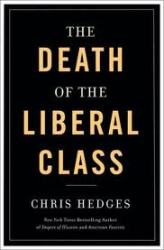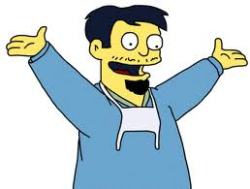 A commenter to a post from last week accused me of being “optimistic”. Downright Pollyannish compared to the likes of one Chris Hedges. Well, I never. Of all the nerve. I dwell in the darkness. No glass is full enough that I can’t see as half empty. Optimistic? How dare you, madam commenter!
A commenter to a post from last week accused me of being “optimistic”. Downright Pollyannish compared to the likes of one Chris Hedges. Well, I never. Of all the nerve. I dwell in the darkness. No glass is full enough that I can’t see as half empty. Optimistic? How dare you, madam commenter!
Now, I am secure enough in my ignorance to admit that I wasn’t sure who this Chris Hedges was or anything about the book Death of the Liberal Class. A Google search followed and, well oh well, I have to admit that the commenter was absolutely correct in her assessment. I am a veritable Santa Claus, bringing joy and happiness to the wider world when put up against Chris Hedges. Where he’s seen fire and rain, I’ve seen sunny days that I thought would never end.
In my defense, I have not spent any time whatsoever in the world’s war torn hotspots like El Salvador back in the day, the former Yugoslavia back in the day, northern Iraq during Saddam Hussein’s violent suppression of Shia and Kurdish rebels in 1991.  I did not leave a high profile post at the New York Times after receiving a formal reprimand from the paper for my denunciation of the Bush administration for its invasion of Iraq. So the opportunity to truly blacken my soul and shrivel my heart has not been offered up to me as it has Mr. Hedges. To such a consummate professional as he, years and 1st person experience combine to provide a dark view. Me? A mere dilettante, an armchair cynic.
I did not leave a high profile post at the New York Times after receiving a formal reprimand from the paper for my denunciation of the Bush administration for its invasion of Iraq. So the opportunity to truly blacken my soul and shrivel my heart has not been offered up to me as it has Mr. Hedges. To such a consummate professional as he, years and 1st person experience combine to provide a dark view. Me? A mere dilettante, an armchair cynic.
So I bought me a copy of Mr. Hedges Death of the Liberal Class from a locally owned, independent bookstore and set down to reading it. Since I’m only a couple chapters in, this isn’t any sort of review but the premise of the book goes something like this: the liberal class, consisting of the media, academia, labour movement and moderate religious institutions, historically acted as the “safety valve” that fought for, at least, “incremental reform” in the face of the vested interests of the “power elite”.  But with the rise of the “corporate state”, Mr. Hedges claims that “the liberal class has distorted its basic belief systems to support unfettered capitalism, the national security state, globalization, and staggering income inequalities.” In so doing, it has “relinquished its moral authority” and ceased speaking for the working and middles classes, helping feed the anger that’s given rise to such movements as the Tea Party (and, dare I say it? Rob Ford here in Toronto.)
But with the rise of the “corporate state”, Mr. Hedges claims that “the liberal class has distorted its basic belief systems to support unfettered capitalism, the national security state, globalization, and staggering income inequalities.” In so doing, it has “relinquished its moral authority” and ceased speaking for the working and middles classes, helping feed the anger that’s given rise to such movements as the Tea Party (and, dare I say it? Rob Ford here in Toronto.)
A dust jacket synopsis to be sure and I bring it up because, despite Chris Hedges’ pedigree including a Pulitzer prize, such a position as he takes in this book will surely relegate him to the fringe bin. That place we put people who spout uncomfortable ideas and question the conventional wisdoms we as a society operate under. It already occurred when Hedges appeared on The Agenda a couple weeks back. During the debate segment of the show, fellow media liberal class member Tony (“The World’s Not Perfect But…”) Keller politely dismissed Hedges’ book treatise as too conspiratorial. Implicit in that argument is the sentiment, and where’s your tinfoil hat, Chrissie?
Why I find all this interesting enough to write about is that at the same time I was discovering Chris Hedges, in an unrelated matter I coincidentally encountered what is now referred to as the Powell Memo.  Written in 1971 by Lewis Powell just a couple months before he was appointed to the U.S. Supreme Court by Richard Nixon, it was sent to Eugene Sydnor, a Chamber of Commerce mucky-muck, and outlined a battle plan for beating back the opponents of America and its free enterprise system. “No thoughtful person can question that the American economic system is under broad attack. This varies in scope, intensity, in the techniques employed, and in the level of visibility. There always have been some who opposed the American system, and preferred socialism or some form of statism (communism or fascism). Also, there always have been critics of the system, whose criticism has been wholesome and constructive so long as the objective was to improve rather than to subvert or destroy. But what now concerns us is quite new in the history of America. We are not dealing with sporadic or isolated attacks from a relatively few extremists or even from the minority socialist cadre. Rather, the assault on the enterprise system is broadly based and consistently pursued. It is gaining momentum and converts.”
Written in 1971 by Lewis Powell just a couple months before he was appointed to the U.S. Supreme Court by Richard Nixon, it was sent to Eugene Sydnor, a Chamber of Commerce mucky-muck, and outlined a battle plan for beating back the opponents of America and its free enterprise system. “No thoughtful person can question that the American economic system is under broad attack. This varies in scope, intensity, in the techniques employed, and in the level of visibility. There always have been some who opposed the American system, and preferred socialism or some form of statism (communism or fascism). Also, there always have been critics of the system, whose criticism has been wholesome and constructive so long as the objective was to improve rather than to subvert or destroy. But what now concerns us is quite new in the history of America. We are not dealing with sporadic or isolated attacks from a relatively few extremists or even from the minority socialist cadre. Rather, the assault on the enterprise system is broadly based and consistently pursued. It is gaining momentum and converts.”
The irony of this memo is rich and the disengenuousness of it deep. Before assuming his position on the bench, Lewis Powell was a corporate lawyer whose firm represented various tobacco companies. Powell himself sat on the board of Phillip Morris. So yeah, the 60s were a bad time for businesses like tobacco  (Damn you, 1963 Surgeon General’s Report!), as government slowly interceded in tying their hands in peddling their poisonous products and marketing them as ‘healthy alternatives’. Powell expresses special disdain for the likes of consumer advocate Ralph Nader and thought it high time for right thinking American business leaders to stand tall against the creeping insidiousness of anti-consumerism and environmentalism.
(Damn you, 1963 Surgeon General’s Report!), as government slowly interceded in tying their hands in peddling their poisonous products and marketing them as ‘healthy alternatives’. Powell expresses special disdain for the likes of consumer advocate Ralph Nader and thought it high time for right thinking American business leaders to stand tall against the creeping insidiousness of anti-consumerism and environmentalism.
More interesting about the Powell memo (or at least, more relevant to this discussion) are the pages and pages written, targeting the culprits (**cough** Communists! **cough**) of said attack on the American way of life and the remedies to combat it. Campus, media and the pulpit. That there would be a huge overlap with Chris Hedges’ pillars of the liberal class. Academia, media and moderate religious institutions. So three decades ago influential business leaders targeted what they saw as opponents of free enterprise (“The threat to the enterprise system is not merely a matter of economics. It also is a threat to individual freedom”) and set out to reverse their influence.
Whether or not they succeeded in doing so is not the point of this post. Clearly writers like Chris Hedges think they did.  But to dismiss his arguments purely on the grounds of being ‘conspiratorial’ as Tony Keller did is lazy and suspect. Mr. Hedges has earned his dim world view by engaging it on the ground. Those disagreeing with him based solely on the notion of his ideas being too fantastical really only serve to prove the point of his book. We purporting to be of the liberal class are our own worst enemies.
But to dismiss his arguments purely on the grounds of being ‘conspiratorial’ as Tony Keller did is lazy and suspect. Mr. Hedges has earned his dim world view by engaging it on the ground. Those disagreeing with him based solely on the notion of his ideas being too fantastical really only serve to prove the point of his book. We purporting to be of the liberal class are our own worst enemies.
— liberally submitted by Cityslikr






